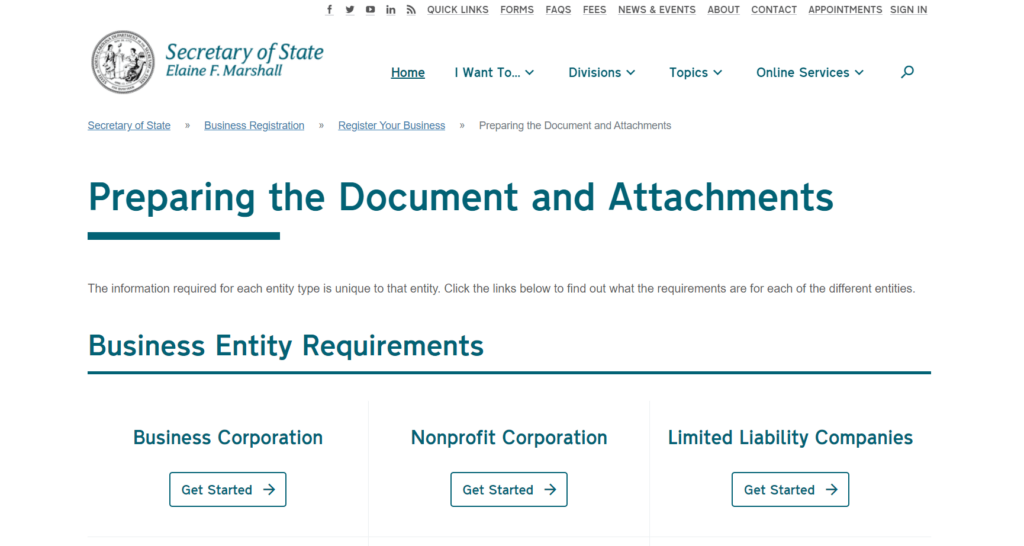Do you dream of turning your North Carolina hustle into a legitimate business? An LLC, or Limited Liability Company, is your perfect springboard. It offers the sweet spot between the flexibility of a sole proprietorship and the ironclad protection of a corporation. That means you get to be your own boss, but your personal assets receive adequate protection from business liabilities – like if a disgruntled customer sues.
But before you dive headfirst into naming your venture and picking office furniture, there’s a crucial step: properly forming your LLC. Don’t worry, this article shows you the roadmap to navigating the process, from picking a catchy yet compliant business name to filing the necessary paperwork with the North Carolina Secretary of State.
You can’t wait to explore this article until the end.
How to Start an LLC in North Carolina
1. Know What an LLC Is and How it Works
2. Learn the Pros and Cons of an LLC
3. Choose a Business Name that Complies with North Carolina Regulations.
4. Designate a Registered Agent to Receive Legal Documents on Your LLC’s Behalf.
5. File Articles of Organization with the North Carolina Secretary of State.
6. Create an Operating Agreement to Outline Ownership and Management of Your LLC.
7. Obtain an Employer Identification Number (EIN) from the IRS.
8. Fulfill Ongoing Legal and Tax Obligations to Maintain Your LLC’s Good Standing
1. Know What an LLC Is and How it Works
To start an LLC in North Carolina, know what it is and how it works. An LLC, or Limited Liability Company, offers both liability protection and tax benefits for your business. You can be the sole owner (single-member LLC) or share ownership with others (multi-member LLC). There’s flexibility in management too – you and other owners can call the shots (member-managed) or appoint specific managers.
The real perk? LLCs avoid double taxation. Unlike some corporations, your business’ profits or losses “pass through” to your personal tax return, meaning you only pay taxes once. This structure offers protection and simplifies taxes, making LLCs a popular choice for many small businesses.
>>>MORE: How to Start an LLC in Kentucky
2. Learn the Pros and Cons of an LLC
Pros
- Offers limited liability protection
- Pass-through taxation (profits/losses go to owners’ tax returns)
- Promises flexible management structure
- Is easier to form and maintain than a corporation
Cons
- Costs more to form and maintain than a sole proprietorship
- Shows complex ownership transfer
- Faces the risk of “piercing the corporate veil” (losing liability protection)
3. Choose a Business Name that Complies with North Carolina Regulations
To start an LLC in North Carolina, choose a business name that complies with the state’s regulations. Here’s what you need to consider for compliance: Pick a name distinct from existing businesses registered with the NC Secretary of State. You can search the database for availability. The name can’t be misleading about your business purpose or contain offensive language.
Remember, include designators like “LLC” or “Limited Liability Company” to distinguish your entity from others. Consider reserving the name you choose for 120 days with a small filing fee if you need more time to complete the LLC formation process.
>>>PRO TIPS: How to Start an LLC in Alabama
4. Designate a Registered Agent to Receive Legal Documents on Your LLC's Behalf
To begin an LLC in North Carolina, designate a registered agent to receive legal documents on your LLC’s behalf. This agent acts as your LLC’s official point of contact for receiving legal documents, including important notices and even lawsuits.
The individual ensures your business maintains good legal standing and gets the necessary notifications of any legal matters. The registered agent can be you, another LLC member, or a registered agent service.
Just remember, the agent must have a physical North Carolina address and be available during regular business hours to receive documents. Don’t skip this step – it’s vital to maintaining legal compliance and protecting your LLC.
5. File Articles of Organization with the North Carolina Secretary of State
To launch an LLC in North Carolina, file articles of organization with the North Carolina Secretary of State. This process is like obtaining your LLC’s birth certificate – it officially establishes your business existence. This is the key step in forming your LLC in North Carolina. Use form L-01, which requires details like your LLC name, address, and the names and addresses of your organizers (the people forming the LLC).
Remember, you can reserve the name you desire beforehand if you want to ensure availability. Once you complete and sign the form, you can file it online through the Secretary of State’s PDF upload portal, mail it in, or deliver it in person.
Don’t forget the $125 filing fee!
6. Create an Operating Agreement to Outline Ownership and Management of Your LLC
To kick off an LLC in North Carolina, create an Operating Agreement to outline ownership and management of your LLC. Note that it is not mandatory to prepare an Operating Agreement for your LLC.
The agreement acts as a rulebook for your business and outlines how you desire ownership and management to function. In it, you detail who the members are (owners) of the LLC and their percentage of ownership based on their contributions (cash, property, services).
You also establish the management of your LLC: member-managed, where all members share control, or manager-managed, where designated members handle day-to-day operations. The agreement further specifies voting rights, profit and loss distribution, and procedures for adding or removing members. Having a clear Operating Agreement minimizes confusion and potential disputes down the road.
>>>GET SMARTER: How to Start an LLC in Connecticut
7. Obtain an Employer Identification Number (EIN) from the IRS
To commence an LLC in North Carolina, obtain an Employer Identification Number (EIN). An Employer Identification Number (EIN), also known as a Federal Tax ID number, is free to obtain from the IRS and important for many business functions. You can apply for your EIN online, by fax, mail, or phone after you file the paperwork to form your LLC with North Carolina. The online application is the fastest option, taking just minutes to complete and granting you your EIN immediately. Whichever method you choose, be ready to provide your Social Security number or ITIN, along with basic information about your LLC like its name, business address, and number of members.
Having an EIN allows you to open business bank accounts, hire employees, file taxes, and build business credit. Don’t wait to get yours – it’s a quick and essential step in getting your North Carolina LLC up and running smoothly.
8. Fulfill Ongoing Legal and Tax Obligations to Maintain Your LLC's Good Standing
To start an LLC in North Carolina, fulfill ongoing legal and tax obligations. And this is not a one-time deal – it’s an essential ongoing process to protect your limited liability and ensure smooth business operations.
First, file an annual report by April 15th each year with the Secretary of State, updating your business information and paying a filing fee. Second, keep up with all federal, state, and local tax filings, which include income taxes, sales taxes, and employment taxes depending on your business activity and structure.
Don’t forget any required business licenses or permits specific to your industry or location. Finally, maintaining good standing also involves keeping meticulous business records and holding regular member meetings, documenting decisions in writing for an LLC with multiple members.
Recap
To start an LLC in North Carolina, understand what an LLC is, how it operates, and weigh its pros and cons. Choose a business name that meets North Carolina’s regulations, then designate a registered agent to handle legal documents.
File the Articles of Organization with the North Carolina Secretary of State. Draft an Operating Agreement to clarify ownership and management roles. Obtain an Employer Identification Number (EIN) from the IRS for tax purposes. Finally, fulfill ongoing legal and tax obligations to maintain your LLC’s good standing.









No Comment! Be the first one.